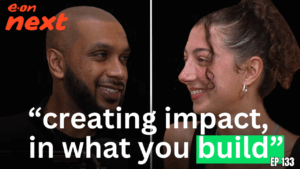
In this episode of the CX Insider Podcast, we’re joined by Abdul Khaled, Head of Digital Customer Experience and Products at E.ON Next, for a deep dive into how organisations can move beyond collecting customer feedback — and start turning it into measurable impact. We unpack how E.ON Next built Compass, an operating model designed to translate insight into action, enabling the business to scale empathy, innovation, and delivery at speed.
From blending behavioural psychology with design thinking to creating a culture where engineers, analysts, and product teams collaborate under one mission, this episode offers a masterclass in making customer-centricity an operational reality
Episode Summary
.
Compass: The CX Operating Model
Compass isn’t just a metaphor — it’s a seven-principle model that gives teams direction in navigating the modern experience economy. Each letter stands for a key element of effective CX: Cognitive Ease, Orchestrated Journeys, Memorable Experiences, Perceived Value, Activation, Social Influence, and Situational Context.
Together, these principles create a practical playbook for designing experiences that feel seamless, human, and meaningful. As Abdul puts it, “Customers don’t judge you by your intentions — they judge you by the ease and consistency of their experiences.”
Whether it’s the simplicity of one-click checkout or E.ON’s own “Free Energy Days”, he emphasises that exceptional CX isn’t built on grand gestures, but on the absence of friction.
From Insight to Action
Abdul believes that successful customer experience isn’t defined by how much feedback a company collects, but by what it does with that feedback. “You can run endless surveys,” he explains, “but if you’re not turning that data into insight — and that insight into delivery — it means nothing.”
His framework, Compass, bridges that gap by embedding continuous improvement into every stage of the customer journey — from insight gathering and behavioural observation to testing, delivery, and optimisation.
Through examples ranging from digital product launches to small behavioural tweaks (like rethinking the placement of fruit bowls in an office), Abdul shows how minor operational changes can make a major impact when grounded in empathy and real-world human behaviour.
Culture, Clarity, and Continuous Improvement
Beyond frameworks and processes, Abdul’s leadership philosophy is rooted in people. His approach to building teams is grounded in clarity, kindness, and accountability. “Clarity is kindness,” he says — a reminder that transparency, even when uncomfortable, builds trust and speed.
He encourages his teams to “find a way or make a way,” empowering them to act fast and prioritise customer value over internal perfectionism. For Abdul, success isn’t about perfection — it’s about momentum. The faster you can move insight into delivery, the faster you can learn, adapt, and evolve.
.
To find out more about Abdul check out our full episode – available on all your favourite channels. Now including YouTube!
This article summarises “Creating Impact in What You Build”.
.
Written by Tamil-Anne Jhala
